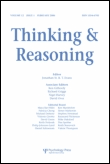
THINKING & REASONING
Scope & Guideline
Exploring the Depths of Human Thought
Introduction
Aims and Scopes
- Cognitive Psychology and Reasoning:
The journal primarily emphasizes cognitive psychology, exploring how individuals reason, make decisions, and solve problems across various contexts, including mathematics, moral judgments, and everyday situations. - Heuristics and Biases:
A consistent focus on the evaluation and implications of heuristics and biases, investigating how these cognitive shortcuts affect rationality and decision-making. - Interdisciplinary Approaches:
The journal welcomes interdisciplinary research that combines insights from psychology, philosophy, sociology, and neuroscience to enrich the understanding of reasoning processes. - Causal Reasoning and Counterfactuals:
Research on causal reasoning, including counterfactual thinking, is a core area, examining how individuals understand causation and the implications of their beliefs. - Social and Moral Reasoning:
The journal also addresses social and moral reasoning, delving into how beliefs, ideologies, and social contexts shape reasoning and decision-making. - Open-mindedness and Reflective Thinking:
An emphasis on the role of open-mindedness and reflective thinking in enhancing reasoning abilities and mitigating biases.
Trending and Emerging
- Impact of Technology on Reasoning:
An emerging trend is the exploration of how technology, including deepfake videos and misinformation, affects reasoning processes and decision-making, reflecting contemporary societal challenges. - Understanding Cognitive Biases in Context:
There is a growing emphasis on understanding cognitive biases within specific contexts, such as political ideologies and environmental issues, which suggests an increasing relevance of situational factors in reasoning. - Integration of Neuroscience and Reasoning:
Recent studies are increasingly incorporating neuroscientific methods to explore the cognitive processes behind reasoning, indicating a trend towards a more integrated approach to understanding thought processes. - Counterfactual and Causal Reasoning:
Research focusing on counterfactuals and causal reasoning is gaining traction, highlighting the importance of these concepts in understanding human cognition and decision-making. - Metacognition and Reflective Practices:
An emphasis on metacognition and the role of reflective thinking in improving reasoning abilities and reducing biases is becoming more prevalent, suggesting a shift towards enhancing cognitive skills through awareness and training.
Declining or Waning
- Traditional Logical Reasoning:
There appears to be a decline in studies focusing exclusively on traditional logical reasoning tasks, as newer research emphasizes more dynamic and contextual forms of reasoning. - Static Models of Thought:
Research that relies on static models of cognition is waning, with a growing preference for studies that consider the fluidity and context-dependency of reasoning processes. - Overemphasis on Individual Differences:
While individual differences in reasoning styles were once a focal point, recent publications show a shift towards understanding how social and contextual factors influence reasoning, leading to a decrease in studies solely focused on individual cognitive traits.
Similar Journals
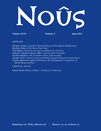
NOUS
Exploring the depths of philosophical inquiry.NOUS is a prestigious academic journal published by WILEY, specializing in the field of Philosophy. Since its inception in 1989, it has maintained a strong reputation within the philosophical community, currently earning a remarkable position in the top quartile (Q1) of its category as of 2023. With an impressive Scopus ranking of #22 out of 806 in the Arts and Humanities – Philosophy category, and achieving a 97th percentile, NOUS serves as a pivotal platform for scholarly discourse, innovative research, and critical thinking. The journal prioritizes high-quality articles that contribute significantly to various philosophical debates, thereby attracting both established and emerging scholars. Although it does not offer an open access option, NOUS is a crucial resource for anyone engaged in serious philosophical inquiry and is dedicated to advancing knowledge and understanding in this rich field.
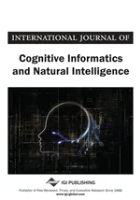
International Journal of Cognitive Informatics and Natural Intelligence
Fostering Collaborative Insights in Cognitive TechnologiesThe International Journal of Cognitive Informatics and Natural Intelligence, published by IGI Global, is an essential resource for researchers and professionals exploring the intersections of cognitive informatics, artificial intelligence, and human-computer interaction. Since its establishment in 2007, this journal has focused on advancing the understanding of cognitive systems and their applications in natural intelligence, contributing significantly to the fields of software engineering and interface design. Operating out of the United States, the journal aims to disseminate high-quality research and innovative methodologies to foster interdisciplinary collaboration. Despite its current standing in Q4 quartiles for the fields of Artificial Intelligence, Human-Computer Interaction, and Software, it serves as a vital platform for emerging scholars and seasoned professionals alike seeking to explore new frontiers in cognitive technologies. While it does not provide direct open access, these publications are instrumental in shaping academic discourse, and contribute to ongoing advancements in how we understand and integrate cognitive science into practical applications.
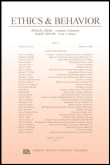
ETHICS & BEHAVIOR
Exploring the Nexus of Morality and ActionETHICS & BEHAVIOR is a leading academic journal published by Routledge Journals, Taylor & Francis Ltd that has been at the forefront of ethical and behavioral research since its inception in 1991. With an ISSN of 1050-8422 and an E-ISSN of 1532-7019, the journal is committed to exploring the complex interactions between morality, ethics, and human behavior in various social contexts. Recognized for its significant contribution to the field, ETHICS & BEHAVIOR holds a notable Q2 ranking in both general psychology and social psychology categories, with impressive Scopus rankings reflecting its academic impact and relevance. Although the journal is not open access, it remains an indispensable resource for researchers, professionals, and students seeking to understand the ethical dimensions of human behavior. Covering diverse topics from applied ethics to behavioral studies, ETHICS & BEHAVIOR serves as a platform for innovative ideas and rigorous empirical research, shaping the discourse in psychology and social sciences. Address: 2-4 Park Square, Milton Park, Abingdon OX14 4RN, Oxon, England.

Axiomathes
Unlocking New Perspectives in Mathematical PhilosophyAxiomathes is a distinguished interdisciplinary journal that rigorously explores the intersections of Mathematics and Philosophy, offering a unique platform for innovative research and discourse since its inception in 1993. Published by Springer, this journal is based in the Netherlands and has garnered a significant reputation in the academic community, as evidenced by its 2023 Scopus rankings, where it stands at Rank #198/806 in Philosophy and Rank #51/90 in Mathematics (miscellaneous). With a focus on advancing theoretical frameworks and fostering critical discussions, Axiomathes aims to bridge the gap between mathematical theories and philosophical implications, making it an essential resource for researchers, professionals, and students alike. The journal is available in both print and open access formats, ensuring broad accessibility and engagement with its content. By continually adapting to the evolving landscapes of these disciplines, Axiomathes remains a vital contributor to academic discourse and knowledge dissemination in the fields of Mathematics and Philosophy.
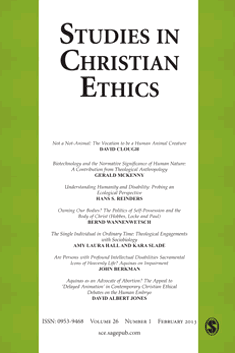
Studies in Christian Ethics
Deepening Understanding of Faith-Based Ethical FrameworksStudies in Christian Ethics, published by SAGE Publications Ltd, is a leading academic journal dedicated to the exploration of Christian ethical thought within the broader landscape of philosophy and religious studies. With an ISSN of 0953-9468 and an E-ISSN of 1745-5235, this journal engages scholars and practitioners in critical dialogue surrounding contemporary ethical issues as they relate to Christian teachings and traditions. Located in the United Kingdom, it has steadily positioned itself within Q3 quartiles for both Philosophy and Religious Studies, showcasing its significant influence, as evidenced by its Scopus rankings in these fields. With a focus on publishing high-quality research, it serves as a vital resource for those aiming to deepen their understanding of ethical frameworks and the implications of faith-based decision-making in diverse contexts. While the journal is not open access, it offers robust access options through institutional subscriptions, ensuring that vital scholarship reaches a wide audience of researchers, professionals, and students interested in the intersection of faith and ethics.
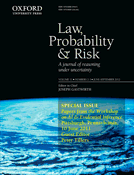
LAW PROBABILITY & RISK
Navigating the Intersection of Law, Risk, and PhilosophyLaw, Probability & Risk is a renowned academic journal published by Oxford University Press, dedicated to exploring the intricate interrelations among law, philosophy, and statistical methodologies. Established in 2011, this journal has quickly ascended in prominence, achieving a remarkable Q1 ranking in both the Law and Philosophy categories, and a solid position in Statistics, Probability, and Uncertainty, pointing to its interdisciplinary relevance. With an ISSN of 1470-8396 and an E-ISSN of 1470-840X, the journal serves as a pivotal resource for researchers, practitioners, and students interested in the application of probabilistic reasoning within legal contexts. Although it operates on a traditional access model, it remains vital for disseminating high-quality research that influences both theoretical and practical aspects of law and ethics. The Scopus rankings further highlight its impact, positioning it within the top percentiles of numerous related fields. As it continues its publication journey through 2024 and beyond, Law, Probability & Risk upholds its commitment to fostering rigorous dialogue and innovative scholarship.

Cognitive Systems Research
Transforming Knowledge into Cognitive SolutionsCognitive Systems Research, published by ELSEVIER, is a prestigious journal dedicated to advancing the field of cognitive systems, a dynamic intersection of Artificial Intelligence, Cognitive Neuroscience, and Experimental Psychology. With an impressive impact factor and ranked in the Q2 category across multiple disciplines, this journal is recognized for its contribution to fundamental and applied research, making it an essential resource for researchers, professionals, and students alike. The journal's scope encompasses innovative studies that push the boundaries of how cognitive processes are understood and simulated within computational frameworks. With a commitment to fostering open science, articles are made readily accessible, promoting the rapid dissemination of knowledge. As the field evolves from 1999 to 2024, Cognitive Systems Research stands as a pivotal forum for the exploration and development of cognitive theories and systems, welcoming high-quality submissions that encourage interdisciplinary collaboration.

JOURNAL OF AUTOMATED REASONING
Shaping the Future of Artificial Intelligence ResearchJOURNAL OF AUTOMATED REASONING is a premier academic journal published by SPRINGER, focusing on the dynamic and evolving fields of Artificial Intelligence, Computational Theory and Mathematics, and Software. With an ISSN of 0168-7433 and E-ISSN 1573-0670, this journal ranks impressively in the second quartile (Q2) across multiple categories, reflecting its significant contribution to the advancement of knowledge in automated reasoning methodologies. Since its inception in 1985, it has served as a vital platform for researchers and professionals to share groundbreaking findings and innovative techniques, facilitating the exploration of algorithms, logical frameworks, and reasoning processes that underpin artificial intelligence systems. Although it does not currently offer Open Access options, it remains a highly regarded resource, cited widely in academia, with its impactful publications reflecting deep insights and rigorous scholarly standards. The journal’s esteemed status and its ongoing commitment to fostering a greater understanding of automated reasoning make it an invaluable asset for those dedicated to pushing the boundaries of these interdisciplinary fields.
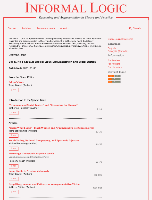
Informal Logic
Empowering Minds through Open Access ResearchInformal Logic is a prestigious, open-access academic journal published by the University of Windsor's Department of Philosophy, focusing on the intersection of reasoning, argumentation, and rhetoric within the field of philosophy. Since its establishment in 2006, it has dedicated itself to promoting rigorous scholarship and innovative methodologies, supporting an array of topics that delve into both theoretical and practical dimensions of informal logic. With an impressive Q1 ranking in philosophy as of 2023, and a commendable ranking of #149 out of 806 within the Arts and Humanities - Philosophy category, the journal holds a significant place in academic discourse, attracting a diverse readership of researchers, professionals, and students alike. Notably, it operates under an open-access model, fostering greater accessibility to high-quality research, and contributing to the growing global dialogue around critical thinking and communication. The journal’s impact and relevance continue to grow, especially in the context of converging years from 2010 to 2024, making it an essential resource for anyone engaged in the study of informal logic.

HEC Forum
Fostering Dialogue on Health Policy ChallengesHEC Forum, an esteemed journal published by Springer, is dedicated to advancing the field of health policy and ethics, bridging critical gaps between healthcare practices and legal frameworks. With the ISSN 0956-2737 and the E-ISSN 1572-8498, this journal has been a pivotal platform since its inception in 1989, collaborating with scholars and practitioners up to the year 2024. Recognized within the Q3 quartile of several categories—including Health Policy and Issues, Ethics and Legal Aspects—HEC Forum holds a significant position in scholarly circles, showcasing rigorous research and discussions relevant to today’s health care challenges. The journal's Scopus rankings highlight its impact, positioned favorably in the realms of Nursing and Health Policy. Although it does not offer open access, HEC Forum remains a critical resource for researchers, professionals, and students seeking to deepen their understanding of health ethics and policy implications in a rapidly evolving landscape.